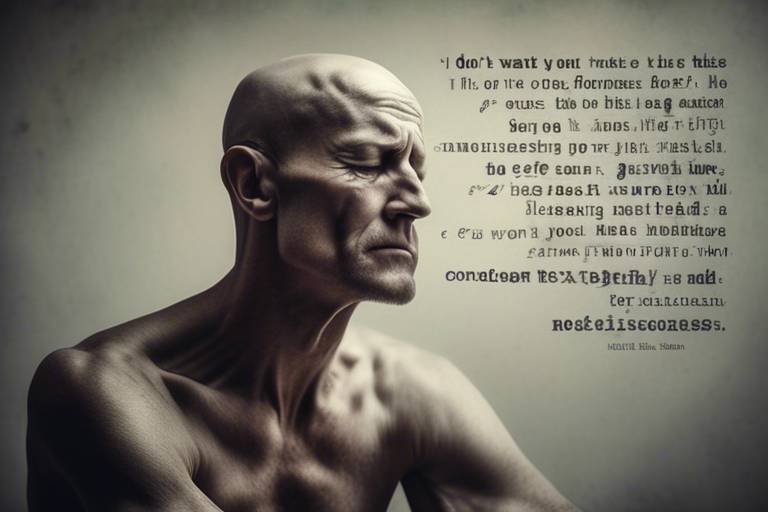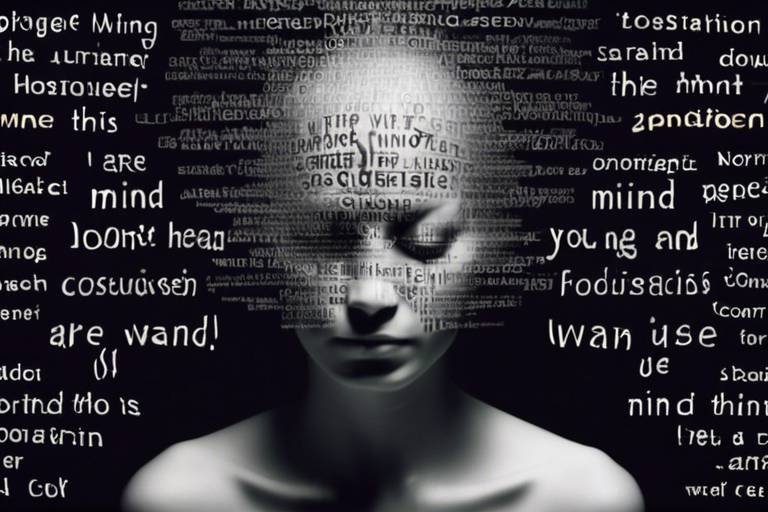The Contours of Consciousness in Ethical Philosophy
This article explores the intricate relationship between consciousness and ethical philosophy, examining how awareness influences moral decision-making and ethical frameworks throughout history and in contemporary discourse.
Understanding consciousness is fundamental to ethical philosophy. It’s not just a buzzword; it’s the very essence of what makes us human. Consciousness is often described as the state of being aware of and able to think about one’s own existence, thoughts, and surroundings. Imagine it as the spotlight that shines on our thoughts and actions, illuminating what we perceive and how we react to the world around us. Various definitions and theories have emerged over time, each adding layers to our understanding. Some argue that consciousness is a byproduct of brain activity, while others believe it transcends mere biological processes.
This complexity is essential when we consider how consciousness shapes our moral judgments. For instance, when faced with a moral dilemma, our conscious awareness of the consequences of our actions can lead us to make more ethical choices. The interplay between consciousness and ethics is like a dance, where each step influences the other, creating a rhythm of moral decision-making that is both intricate and dynamic.
Throughout history, different philosophical traditions have approached the concept of consciousness in unique ways. From ancient thinkers to modern philosophers, the evolution of ideas surrounding consciousness and ethics tells a rich story. In this journey, we can observe how consciousness has been a pivotal element in shaping ethical frameworks.
Eastern philosophies, such as Buddhism and Hinduism, offer unique insights into consciousness. These traditions delve deep into the nature of the self and the universe, suggesting that our consciousness is interconnected with all beings. In Buddhism, for example, the concept of anatta or non-self challenges the notion of a permanent self, prompting followers to consider how their actions impact the collective consciousness.
One of the key aspects of Eastern thought is mindfulness, which emphasizes being present and aware in each moment. Mindfulness encourages individuals to observe their thoughts and feelings without judgment, fostering a deeper understanding of their ethical responsibilities. This practice can enhance moral reasoning by allowing individuals to reflect on their actions and the intentions behind them. When we cultivate mindfulness, we create a space where ethical living becomes a natural extension of our conscious awareness.
In traditions that embrace reincarnation, consciousness extends beyond a single life. This belief profoundly influences ethical considerations and responsibilities. If we are to experience multiple lifetimes, the actions we take in this life ripple through time, impacting not just ourselves but future incarnations. This perspective encourages a more profound sense of accountability, as individuals recognize that their choices have lasting consequences that transcend their current existence.
Western philosophy has also shaped our understanding of consciousness. Thinkers like Descartes, who famously said, “I think, therefore I am,” emphasized the importance of self-awareness in defining existence. Others, like Kant, posited that consciousness is integral to moral reasoning, as it allows individuals to discern right from wrong. This discourse has evolved, with contemporary philosophers exploring the implications of consciousness in ethical frameworks and moral accountability.
The connection between consciousness and moral responsibility is a rich field of inquiry. Awareness of one’s actions significantly impacts ethical accountability. When we are conscious of the effects of our choices, we are more likely to take responsibility for them. This awareness can be likened to a compass, guiding us through the murky waters of moral dilemmas.
Intent plays a crucial role in moral evaluations. It’s not enough to simply act; we must also consider why we act. Consciousness informs our intentions, and being aware of our motives can significantly alter the ethical implications of our actions. For instance, helping someone out of genuine compassion carries a different moral weight than doing so for personal gain. This distinction is what makes ethical philosophy so compelling and complex.
Recent advancements in neuroscience provide fascinating insights into the brain's role in ethical decision-making. Studies show that certain areas of the brain are activated when we contemplate moral choices, revealing the biological underpinnings of our ethical reasoning. This intersection of science and philosophy invites us to reconsider traditional views on consciousness and morality, suggesting that our ethical frameworks may be more intertwined with our biology than previously thought.
- What is consciousness? - Consciousness refers to the state of being aware of and able to think about one's own existence, thoughts, and surroundings.
- How does consciousness influence ethics? - Consciousness shapes our moral judgments and decision-making by allowing us to be aware of the consequences of our actions.
- What role does mindfulness play in ethical philosophy? - Mindfulness enhances moral reasoning by fostering awareness and reflection on our actions and intentions.
- How do different cultures view consciousness? - Eastern philosophies often see consciousness as interconnected, while Western philosophies focus on individual awareness and responsibility.

The Nature of Consciousness
Understanding consciousness is fundamental to ethical philosophy. It serves as the lens through which we interpret our experiences, make decisions, and ultimately define our moral compass. But what exactly is consciousness? Is it merely our awareness of the world around us, or does it delve deeper into the essence of our being? Throughout history, philosophers, scientists, and spiritual leaders have wrestled with these questions, offering a multitude of definitions and theories.
At its core, consciousness can be described as the state of being aware of and able to think about one’s own existence, thoughts, and surroundings. This awareness is not just passive; it actively shapes our perceptions and influences our moral judgments. For instance, when faced with a moral dilemma, our conscious awareness allows us to weigh options, consider consequences, and reflect on our values. In this sense, consciousness acts as a guiding force in our ethical decision-making processes.
Several theories of consciousness attempt to explain its nature. Here are a few notable ones:
- Dualism: Proposed by René Descartes, this theory posits that the mind and body are distinct entities. Consciousness exists separately from the physical world, leading to debates about the implications for moral responsibility.
- Physicalism: This perspective argues that consciousness arises from physical processes in the brain. It suggests that our ethical decisions are ultimately rooted in biological functions, which raises questions about free will and accountability.
- Panpsychism: An intriguing theory that posits consciousness is a fundamental aspect of all matter. This view expands ethical considerations to include not just humans but all living entities, urging us to rethink our moral responsibilities.
Moreover, the role of consciousness in shaping human experiences cannot be overstated. Our ability to reflect on our thoughts and feelings allows us to develop empathy, compassion, and a sense of justice. This reflective capacity is what enables us to engage in moral reasoning, considering not just our own interests but also the well-being of others. For instance, when we see someone in distress, our conscious awareness triggers empathy, prompting us to help. Without this awareness, ethical behavior would be severely limited.
In contemporary discourse, the nature of consciousness continues to be a hot topic, especially with advancements in neuroscience. Researchers are exploring how different states of consciousness—such as waking, dreaming, and altered states—affect our ethical decision-making. Are we more likely to make altruistic choices when we are fully conscious, or do altered states of mind provide unique insights into ethical dilemmas? These questions are not just academic; they have real-world implications for how we understand moral responsibility.
In conclusion, the nature of consciousness is a complex and multifaceted topic that sits at the intersection of philosophy, science, and ethics. As we continue to explore this intricate relationship, we uncover deeper insights into what it means to be human and how our awareness shapes our moral landscape.

Historical Perspectives on Consciousness
Throughout history, the concept of consciousness has fascinated philosophers, scientists, and thinkers alike. Different eras and cultures have approached consciousness from various angles, each contributing to our understanding of its implications for ethical philosophy. In ancient times, philosophers like Plato and Aristotle laid the groundwork for discussions about the mind and its relation to morality. They pondered questions such as, "What makes us conscious?" and "How does our awareness influence our actions?" These early inquiries set the stage for centuries of philosophical exploration.
As we moved into the Middle Ages, consciousness was often intertwined with religious and spiritual beliefs. Thinkers such as Augustine of Hippo emphasized the role of divine illumination in human awareness, suggesting that consciousness is a gift from a higher power. This perspective influenced ethical frameworks that prioritized divine command and moral absolutes, leading to the idea that true morality is rooted in a conscious relationship with the divine.
The Enlightenment brought a shift in perspective, as philosophers like Descartes and Kant began to emphasize reason and individual consciousness. Descartes famously declared, "I think, therefore I am," highlighting the significance of self-awareness in understanding existence. This era encouraged the notion that moral reasoning is a product of rational thought, where consciousness plays a pivotal role in discerning right from wrong. Kant further developed this idea, proposing that moral actions must be guided by rational principles, which are accessible through conscious thought.
In the 19th and 20th centuries, the exploration of consciousness took on new dimensions with the advent of psychology and neuroscience. Figures like Sigmund Freud introduced the idea of the unconscious mind, suggesting that much of our behavior is influenced by hidden thoughts and feelings. This raised questions about moral responsibility: if our actions are driven by unconscious impulses, to what extent are we accountable for them? Similarly, the rise of behaviorism challenged the notion of consciousness altogether, leading to debates about the relevance of awareness in ethical considerations.
Today, we find ourselves at the intersection of philosophy and science, where advancements in neuroscience are shedding light on the complexities of consciousness. Researchers are uncovering how brain activity correlates with moral decision-making, prompting us to reconsider long-held beliefs about free will and ethical responsibility. The historical perspectives on consciousness reveal a rich tapestry of ideas that continue to shape contemporary discourse on ethics, urging us to reflect on the profound relationship between our awareness and our moral choices.
As we explore these historical perspectives, it’s clear that consciousness is not merely a philosophical abstraction; it is a living, breathing element of our ethical landscape. The journey of understanding consciousness is ongoing, inviting us to engage with the past while critically examining our present and future ethical frameworks.
- What is consciousness in ethical philosophy? Consciousness refers to the awareness of oneself and one’s surroundings, playing a crucial role in moral decision-making and ethical frameworks.
- How have historical perspectives shaped our understanding of consciousness? Historical perspectives have provided various interpretations of consciousness, influencing ethical theories from ancient to modern times.
- What role does neuroscience play in understanding consciousness? Neuroscience offers insights into how brain functions relate to ethical decision-making, challenging traditional views on free will and moral responsibility.
- How do Eastern philosophies contribute to the discourse on consciousness? Eastern philosophies, such as Buddhism and Hinduism, emphasize mindfulness and the interconnectedness of consciousness, influencing ethical behavior and moral development.

Eastern Philosophical Views
When we dive into the depths of Eastern philosophies, we uncover a treasure trove of insights regarding the intricate relationship between consciousness and ethics. Traditions such as Buddhism and Hinduism provide a unique lens through which we can examine how consciousness shapes ethical behavior and moral development. These philosophies do not merely view consciousness as a passive observer of life but rather as an active participant that influences our thoughts, actions, and ultimately, our ethical frameworks.
In Buddhism, for instance, consciousness is seen as a dynamic process that is intimately connected to the concept of interdependence. This interdependence suggests that our actions are not isolated; they ripple through the fabric of existence, impacting not just ourselves but also the world around us. This perspective encourages individuals to cultivate a heightened awareness of their thoughts and actions, fostering a sense of responsibility that is deeply rooted in the understanding that every action has consequences. The Buddhist practice of mindfulness serves as a practical tool to enhance this awareness, allowing individuals to engage in ethical decision-making with a clear and focused mind.
Similarly, Hinduism introduces the idea of Atman, or the self, which is considered a reflection of the universal consciousness, Brahman. This belief emphasizes the interconnectedness of all beings and the importance of ethical conduct in achieving spiritual growth. By recognizing that our consciousness is part of a larger whole, individuals are encouraged to act with compassion and integrity, understanding that their moral choices contribute to the greater good. The ethical teachings found in texts such as the Bhagavad Gita underscore the significance of self-awareness and intention in moral decision-making, urging practitioners to align their actions with their higher selves.
Mindfulness, a cornerstone of Eastern thought, plays a pivotal role in ethical decision-making. It is the practice of being fully present and engaged in the moment, which cultivates a deeper awareness of one’s thoughts, emotions, and actions. Through mindfulness, individuals can pause and reflect before reacting, allowing them to consider the ethical implications of their choices. This practice not only enhances moral reasoning but also promotes a lifestyle rooted in ethical living. By being mindful, one can navigate the complexities of moral dilemmas with greater clarity and compassion, leading to more thoughtful and responsible decisions.
In traditions that embrace the concept of reincarnation, consciousness is viewed as a continuum that extends beyond a single lifetime. This belief profoundly influences ethical considerations and responsibilities, as individuals are encouraged to think about the implications of their actions not just in the present but across multiple lifetimes. The idea that one’s current actions can affect future existences fosters a sense of accountability that is deeply embedded in ethical philosophy. It invites individuals to act with integrity, knowing that their choices echo through time and shape their future selves. This perspective can instill a profound sense of moral duty, urging individuals to cultivate virtues such as kindness, compassion, and justice.
In summary, Eastern philosophies provide a rich tapestry of understanding regarding consciousness and ethics. By embracing the interconnectedness of all beings and the significance of mindfulness, these traditions offer valuable insights that can enhance our moral frameworks and decision-making processes. As we navigate the complexities of ethical dilemmas in our lives, the teachings of Eastern thought remind us of the profound impact our consciousness has on our actions and the world around us.
- What is the role of consciousness in ethical decision-making?
Consciousness plays a crucial role in ethical decision-making as it allows individuals to reflect on their thoughts and actions, consider their implications, and make informed choices that align with their moral values.
- How do Eastern philosophies view the concept of mindfulness?
Eastern philosophies, particularly Buddhism, view mindfulness as a vital practice that enhances awareness and promotes ethical living by encouraging individuals to be fully present and considerate of their actions.
- What impact does the belief in reincarnation have on ethics?
The belief in reincarnation encourages individuals to consider the long-term consequences of their actions, fostering a sense of moral responsibility that extends beyond a single lifetime.

The Concept of Mindfulness
Mindfulness, a concept deeply rooted in Eastern philosophies, particularly Buddhism, is more than just a trendy buzzword; it's a profound practice that encourages individuals to cultivate a heightened awareness of the present moment. Imagine walking through a bustling market, the vibrant colors of fruits and vegetables, the aroma of spices wafting through the air, and the sounds of laughter and chatter surrounding you. Instead of being lost in thought about the past or future, mindfulness invites you to fully engage with these sensory experiences. It asks you to be present—to notice, to feel, and to appreciate the world around you.
This practice of mindfulness has significant implications for ethical decision-making. By fostering awareness, individuals can better recognize their thoughts, emotions, and motivations, which in turn influences their moral judgments. When we are mindful, we are less likely to react impulsively or out of habit; instead, we can pause and reflect on our choices. This reflection can lead to more thoughtful and ethical decisions. For instance, consider a situation where someone is faced with a moral dilemma, such as whether to help a stranger in need. A mindful approach would encourage them to weigh their feelings, the potential consequences of their actions, and the ethical principles at play.
Moreover, mindfulness promotes empathy—a crucial component of ethical behavior. When we practice being present, we become more attuned to the feelings and experiences of others. This awareness can foster compassion, leading to a deeper understanding of how our actions impact those around us. In a world that often feels disconnected, mindfulness serves as a bridge, reminding us of our shared humanity and the ethical responsibility we hold toward one another.
To illustrate the connection between mindfulness and ethical behavior, consider the following table that outlines key aspects of mindfulness and their ethical implications:
| Aspect of Mindfulness | Ethical Implication |
|---|---|
| Awareness | Increases understanding of consequences |
| Presence | Encourages thoughtful decision-making |
| Empathy | Fosters compassion and social responsibility |
| Reflection | Promotes accountability for actions |
Incorporating mindfulness into daily life can be a transformative journey. Simple practices, such as meditation, mindful breathing, or even just taking a moment to pause and observe your surroundings, can enhance your ability to make ethical choices. By being aware of our thoughts and feelings, we create space for reflection and intentionality in our actions. So, the next time you're faced with a decision, big or small, ask yourself: Am I being mindful? This question can be the key to unlocking a more ethical and fulfilling life.
- What is mindfulness? Mindfulness is the practice of being fully present and engaged in the moment, without judgment.
- How does mindfulness relate to ethics? Mindfulness enhances awareness and reflection, which can lead to more ethical decision-making.
- Can mindfulness improve empathy? Yes, by fostering awareness of others' feelings, mindfulness can enhance our capacity for empathy and compassion.
- What are some ways to practice mindfulness? Techniques include meditation, mindful breathing, and simply observing your environment.

Reincarnation and Ethics
The concept of reincarnation introduces a fascinating dimension to ethical considerations, particularly in how individuals perceive their actions and responsibilities. In traditions that embrace reincarnation, such as Hinduism and Buddhism, the belief that consciousness transcends a single lifetime significantly shapes moral frameworks. This perspective compels individuals to consider not just the immediate consequences of their actions but also the long-term implications that may unfold across multiple lifetimes.
Imagine living your life with the understanding that every action, no matter how small, could echo through time. This notion encourages a sense of responsibility that extends beyond the present moment. For instance, if one believes that harming another being could lead to suffering in future lives, the ethical imperative to act with kindness and compassion becomes even more pronounced. This creates a moral landscape where the interconnectedness of all beings is acknowledged, fostering a deeper commitment to ethical living.
Furthermore, reincarnation challenges the simplistic notion of reward and punishment. In many Eastern philosophies, the cycle of birth, death, and rebirth (samsara) is influenced by one's karma—the accumulated actions from past lives. This means that ethical behavior is not merely about adhering to societal norms or avoiding punishment in this life, but rather about cultivating a virtuous character that will yield positive outcomes in future incarnations. The idea of karma adds a layer of complexity to moral decision-making, as individuals must consider how their choices resonate through their own future experiences as well as those of others.
To illustrate this, let’s consider a table that summarizes the key ethical implications of reincarnation:
| Aspect | Implication |
|---|---|
| Awareness of Consequences | Encourages thoughtful consideration of actions, promoting a long-term view of morality. |
| Interconnectedness | Fosters empathy and compassion, recognizing the impact of one's actions on others. |
| Karma | Incentivizes ethical behavior as a means to improve future circumstances. |
| Personal Growth | Encourages continuous moral development across lifetimes. |
In conclusion, the belief in reincarnation enriches ethical philosophy by instilling a profound sense of responsibility and interconnectedness. It challenges individuals to think beyond the immediate consequences of their actions, urging them to cultivate virtues that will resonate throughout their future lives. This perspective not only enhances moral reasoning but also encourages a more compassionate approach to living in harmony with others. Ultimately, the ethical implications of reincarnation invite us to reflect on our choices and their lasting impact on the tapestry of existence.
- What is reincarnation? Reincarnation is the belief that the soul or consciousness is reborn into a new body after death, continuing a cycle of life and death.
- How does reincarnation influence ethical behavior? It encourages individuals to consider the long-term consequences of their actions, fostering a sense of responsibility towards others and oneself.
- What role does karma play in reincarnation? Karma refers to the actions and their ethical implications that influence future circumstances, shaping the experiences one encounters in subsequent lives.
- Are there any philosophical traditions that reject reincarnation? Yes, many Western philosophies, including some branches of Christianity, do not subscribe to the idea of reincarnation and instead focus on a linear view of life and morality.

Western Philosophical Views
When we dive into the rich tapestry of Western philosophy, we find a fascinating interplay between consciousness and ethics. Think of it as a grand conversation that spans centuries, where each philosopher adds their unique voice to the discourse. From the profound musings of Plato to the groundbreaking ideas of modern thinkers, the exploration of consciousness has been a pivotal theme. In essence, Western philosophy has sought to unravel the complexities of human awareness and its implications for moral behavior.
One of the earliest contributors to this dialogue was Aristotle, who posited that consciousness is tied to the concept of the soul. For him, the soul was not merely a mystical entity but the essence of being that informs our rational capacities. He argued that ethical behavior arises from a well-developed consciousness, which enables individuals to discern right from wrong. This notion of rationality is crucial; it suggests that our ethical decisions are not just instinctual but are also informed by a conscious deliberation of our choices.
Fast forward to the Enlightenment, where philosophers like Immanuel Kant revolutionized the field with his categorical imperative. Kant believed that consciousness plays a vital role in moral legislation; it is through our awareness and rational faculties that we can formulate universal moral laws. He famously stated, "Act only according to that maxim whereby you can, at the same time, will that it should become a universal law." This idea underscores the responsibility that comes with consciousness: the ability to reflect on our actions and their potential impact on others.
In the 19th century, thinkers like Friedrich Nietzsche challenged the prevailing notions of morality and consciousness. Nietzsche argued that traditional moral frameworks were often a product of societal constructs rather than inherent truths. He emphasized the importance of individual perspective and consciousness in shaping one's moral compass. For Nietzsche, the journey of self-discovery and awareness was essential in transcending conventional morality to create one’s ethical standards.
As we moved into the 20th century, existentialists like Jean-Paul Sartre further explored the relationship between consciousness and ethics. Sartre famously declared that "existence precedes essence," implying that individuals must create their own values through conscious choice. This radical freedom comes with the weight of responsibility; our awareness of the choices we make directly influences our moral standing. Sartre’s existentialism pushes us to confront the uncomfortable truth that we are the architects of our ethical beliefs.
Moreover, the advent of cognitive science and neuroscience has opened new avenues for understanding consciousness within ethical philosophy. Contemporary philosophers are increasingly interested in how brain processes influence moral decision-making. This intersection of science and philosophy raises intriguing questions: How does our conscious awareness shape our moral judgments? Can neuroscience provide insights into the ethical implications of our actions?
To summarize, Western philosophical views on consciousness reveal a dynamic and evolving dialogue. From Aristotle’s rationalism to Kant’s moral imperatives, and from Nietzsche’s individualism to Sartre’s existentialism, the exploration of consciousness has been central to our understanding of ethical behavior. As we continue to grapple with these profound questions, one thing remains clear: consciousness is not just a passive state of awareness; it is an active force that shapes our moral landscape.
- What is the role of consciousness in moral decision-making? Consciousness allows individuals to reflect on their actions, consider the consequences, and make informed ethical choices.
- How have historical philosophers influenced modern ethics? Historical figures like Kant and Nietzsche have laid the groundwork for contemporary discussions on morality, emphasizing the importance of individual awareness and rational thought.
- Can neuroscience inform our understanding of ethical behavior? Yes, advancements in neuroscience provide insights into how brain functions relate to moral reasoning and decision-making processes.

Consciousness and Moral Responsibility
When we think about moral responsibility, the role of consciousness cannot be overstated. It's as if consciousness is the spotlight illuminating our choices, allowing us to navigate the complex landscape of ethical decision-making. Without this awareness, how can we truly understand the implications of our actions? Imagine driving a car without being aware of the road ahead; you’d be a danger not only to yourself but to others as well. Similarly, our moral choices require a clear understanding of our intentions and the potential consequences of our actions.
One of the most intriguing aspects of this relationship is how our level of consciousness can directly influence our sense of accountability. For instance, consider a scenario where someone acts impulsively, perhaps due to stress or external pressures. In such cases, their awareness—or lack thereof—of the consequences may mitigate their moral responsibility. But does this mean they are entirely absolved of blame? This question leads us to explore the nuances of intent and awareness in ethical evaluations.
In philosophical discourse, the idea that consciousness shapes moral responsibility has been a hot topic. Thinkers like Immanuel Kant emphasized the importance of intention in moral judgments. Kant argued that true moral actions stem from a sense of duty, which requires a conscious understanding of right and wrong. On the other hand, some contemporary philosophers suggest that our moral responsibility is intertwined with our cognitive capacities. They propose that if we lack the consciousness to comprehend our actions fully, our moral accountability may be lessened.
Moreover, neuroscience has begun to unravel the complexities of how our brains process moral decisions. Recent studies suggest that certain brain regions are activated when we contemplate the ethical implications of our actions. This leads to fascinating questions: Are we truly in control of our moral choices, or are they influenced by subconscious processes? The intersection of neuroscience and moral philosophy opens up a dialogue about the nature of free will and responsibility.
To further illustrate the relationship between consciousness and moral responsibility, consider the following table that summarizes different perspectives:
| Philosopher | View on Consciousness and Moral Responsibility |
|---|---|
| Immanuel Kant | Emphasizes the role of intention and rationality in moral actions. |
| David Hume | Argues that emotions and feelings play a significant role in moral judgments. |
| Contemporary Neuroscientists | Highlight the influence of brain processes on moral decision-making. |
In conclusion, consciousness is not just a passive observer in the realm of ethics; it is an active participant that shapes our moral landscape. As we navigate our lives, the awareness of our choices and their repercussions becomes crucial in holding ourselves accountable. Whether through philosophical inquiry or scientific exploration, the connection between consciousness and moral responsibility continues to spark debate and inspire deeper understanding.
- What is the relationship between consciousness and moral responsibility? Consciousness allows individuals to be aware of their actions and their consequences, which is essential for moral accountability.
- Can a lack of consciousness reduce moral responsibility? Yes, if a person is not fully aware of their actions due to impulsivity or external factors, their moral responsibility may be lessened.
- How does neuroscience contribute to our understanding of ethics? Neuroscience provides insights into how our brains process moral decisions, highlighting the complexities of consciousness in ethical reasoning.

The Role of Intent in Ethics
When we discuss ethics, one of the most intriguing aspects that often comes to light is the concept of intent. Intent refers to the purpose or goal behind an action, and it plays a pivotal role in how we evaluate the morality of that action. Think about it: when someone does something wrong, we often ask, "What were they thinking?" This question highlights how crucial intent is in our moral assessments. If a person accidentally causes harm, we might be more inclined to forgive them than if they acted with malicious intent. This difference in perception is rooted in our understanding of consciousness and awareness.
Intent can be seen as the compass that guides our actions, shaping the ethical landscape in which we navigate our decisions. For instance, consider the classic ethical dilemma of a doctor who must decide whether to save one patient at the expense of another. If the doctor’s intent is to save a life, their actions might be viewed more favorably, even if the outcome is tragic. In this way, intent acts as a lens through which we interpret actions and their moral weight.
Moreover, the significance of intent extends beyond individual actions to broader societal implications. Laws often differentiate between murder and manslaughter based on the perpetrator's intent. This legal distinction reflects a deeper ethical understanding that not all actions are created equal; rather, they are colored by the motivations behind them. For example, in many legal systems, premeditated actions are treated more harshly than those that occur in the heat of the moment, emphasizing how intent shapes our ethical frameworks.
Furthermore, intent is not just about the immediate consequences of an action but also about the long-term ethical implications. When we act with good intentions, we are often more willing to accept the risks associated with our decisions. This is particularly evident in fields like philanthropy and social justice, where the intent to help can sometimes lead to unintended negative consequences. Here, the challenge lies in balancing good intentions with the awareness of potential outcomes, a dance that requires both ethical reflection and conscious deliberation.
In the realm of ethics, we also encounter the idea of moral luck, which refers to the phenomenon where the morality of an action is judged based on its outcome rather than the intent behind it. This raises essential questions: Should we hold someone accountable for a bad outcome if their intentions were good? How do we navigate the murky waters of intent when the results can be so starkly different? These questions compel us to reflect on the complexities of human behavior and the intricate relationship between consciousness, intent, and ethics.
To further illustrate the importance of intent in ethical decision-making, consider the following table that summarizes key distinctions:
| Type of Action | Intent | Moral Evaluation |
|---|---|---|
| Accidental Harm | Unintentional | Generally Forgiven |
| Malicious Harm | Intentional | Condemned |
| Good Deed with Negative Outcome | Intent to Help | Mixed Evaluation |
In conclusion, the role of intent in ethics cannot be overstated. It serves as the foundation upon which we build our moral judgments, guiding our evaluations of actions and their consequences. As we continue to explore the contours of consciousness in ethical philosophy, understanding intent will undoubtedly remain a crucial element in our quest for moral clarity.
- Why is intent important in ethical decision-making?
Intent helps us understand the motivations behind actions, allowing for a more nuanced evaluation of morality. - How does intent affect legal judgments?
Legal systems often differentiate between actions based on the intent behind them, impacting the severity of consequences. - Can good intentions lead to negative outcomes?
Yes, good intentions can sometimes result in unintended harm, highlighting the complexity of ethical decision-making.

Neuroscience and Ethical Decision-Making
In recent years, the intersection of neuroscience and ethics has sparked a fascinating dialogue about how our brains influence our moral choices. Imagine your brain as a complex orchestra, where each neuron plays a note that contributes to the symphony of your decision-making process. This intricate interplay of neural activity not only shapes our thoughts but also our ethical frameworks. By examining how brain functions correlate with moral reasoning, we can gain a deeper understanding of what drives our ethical behaviors.
Neuroscience has revealed that certain areas of the brain are particularly active when we engage in ethical decision-making. For instance, the prefrontal cortex, often associated with higher-order thinking, plays a crucial role in evaluating consequences and controlling impulses. This area is like the conductor of our moral orchestra, guiding our decisions based on rational thought and social norms. In contrast, the amygdala, which processes emotions, can trigger instinctual responses that might lead us to act on impulse rather than reason. This duality raises intriguing questions: Are we truly in control of our ethical decisions, or are we at the mercy of our brain's wiring?
Moreover, studies using functional magnetic resonance imaging (fMRI) have shown that when faced with moral dilemmas, our brains light up in specific patterns that reveal how we weigh different ethical considerations. For example, when contemplating a decision that pits utilitarianism against deontological ethics, different neural pathways are activated. This suggests that our moral judgments are not merely abstract concepts but are deeply rooted in our biological makeup.
To illustrate this, consider the famous trolley problem, where one must choose between pulling a lever to divert a runaway trolley onto a track where it will kill one person instead of five. Neuroscientific research indicates that individuals often experience conflicting emotions during this dilemma, which can be traced back to the activation of various brain regions. The emotional response may prompt a visceral reaction, while the cognitive assessment engages the prefrontal cortex to analyze the consequences. This tug-of-war between emotion and reason is a hallmark of our ethical decision-making process.
Furthermore, the implications of neuroscience on ethics extend beyond understanding individual choices. They challenge traditional notions of moral responsibility. If our decisions are significantly influenced by our brain's biology, to what extent can we hold individuals accountable for their actions? This question is particularly relevant in legal contexts, where understanding the neural basis of behavior could reshape our views on culpability.
As we delve deeper into the brain's role in ethical decision-making, it becomes clear that the relationship between neuroscience and ethics is not just a scientific curiosity; it has profound implications for how we understand human behavior. By integrating insights from neuroscience with ethical philosophy, we can develop a more nuanced view of morality that acknowledges the complexities of human cognition and emotion.
- How does neuroscience influence our understanding of moral responsibility?
Neuroscience suggests that our ethical decisions are influenced by biological processes, which raises questions about the extent of our moral accountability. - What role do emotions play in ethical decision-making?
Emotions, processed by the amygdala, can significantly impact our moral choices, often leading to instinctual rather than rational decisions. - Can understanding neuroscience improve ethical reasoning?
Yes, by understanding the brain's mechanisms, we can better navigate moral dilemmas and enhance our ethical reasoning skills.
Frequently Asked Questions
- What is consciousness in the context of ethical philosophy?
Consciousness in ethical philosophy refers to the awareness and understanding of one's thoughts, feelings, and actions. It plays a vital role in shaping moral judgments and decision-making, influencing how individuals perceive right and wrong.
- How do Eastern philosophies view consciousness?
Eastern philosophies, such as Buddhism and Hinduism, offer a unique perspective on consciousness, often seeing it as interconnected with ethical behavior. They emphasize concepts like mindfulness, which encourages individuals to be present and aware, fostering moral development and ethical living.
- What is the significance of mindfulness in ethical decision-making?
Mindfulness is crucial in ethical decision-making as it cultivates awareness of one's thoughts and actions. By practicing mindfulness, individuals can enhance their moral reasoning, leading to more thoughtful and responsible choices in their ethical lives.
- How does the concept of reincarnation influence ethics?
In traditions that believe in reincarnation, consciousness is seen as extending beyond a single life. This belief encourages individuals to consider the ethical implications of their actions across lifetimes, fostering a sense of responsibility towards others and the environment.
- What role does intent play in moral evaluations?
Intent is a key factor in moral evaluations, as it reflects an individual's awareness of their motives. Understanding one's intent can significantly impact how actions are judged ethically, highlighting the importance of conscious decision-making in moral philosophy.
- How does neuroscience intersect with ethical decision-making?
Recent advancements in neuroscience have shed light on how the brain processes ethical decisions. This intersection between science and philosophy provides valuable insights into the mechanisms of consciousness and its influence on moral behavior, enriching our understanding of ethical frameworks.



















